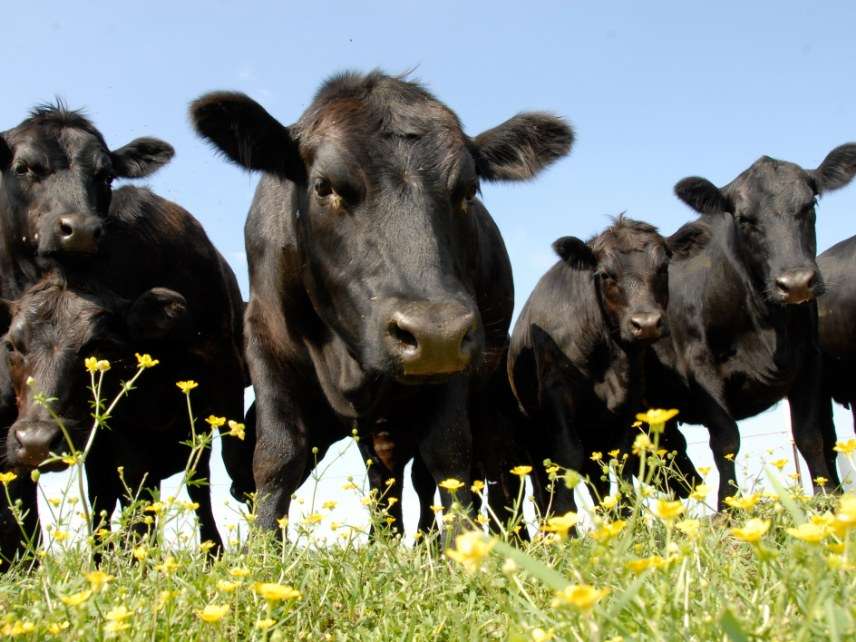Momentum Building to Cast Off USDA Checkoff Marketing Programs
Two lawsuits and action in Congress indicate wasteful, unconstitutional mandates may be on their way out.

Last week, a federal court in Montana handed an important victory to opponents of USDA checkoff programs.
As I describe in my recent book, Biting the Hands that Feed Us, USDA checkoff programs exist for dairy, beef, pork, and poultry, among other foods. They require ranchers and farmers to pay for collective marketing of their products. The USDA argues the mandatory collectivist marketing empowers businesses.
Critics disagree. In the Montana case, the federal court granted a preliminary injunction to the plaintiff, the Ranchers-Cattlemen Action Legal Fund (R-CALF), a nonprofit advocacy group that represents independent ranchers, farmers, and cattlemen.
R-CALF argued the USDA Beef Checkoff Program violates the First Amendment because it forces R-CALF members to subsidize speech—specifically, advertising—paid for by the private Montana Beef Council. The U.S. District Court agreed, granting R-CALF a preliminary injunction and barring the Montana Beef Council from using any funds "it collects under the Beef Checkoff Program to fund its advertising campaigns" without prior consent from the farmer or rancher who pays the state beef council.
The beef checkoff permits the Montana Beef Council to use a portion of the money it collects to fund its own promotional campaigns. Currently, the mandatory federal assessment charged to farmers and ranchers under the USDA Beef Checkoff Program is $1 per head of cattle.
In Montana, the state beef council collects the money—as similar beef councils do in other states—and sends half to the national beef board. That helps the federal program pay for marketing, including the famed "Beef. It's What's for Dinner" campaign. The Montana Beef Council keeps the other half "to fund its own promotional activities."
The U.S. Supreme Court ruled in a 2005 First Amendment challenge to the USDA's beef checkoff program that these forced marketing campaigns pass constitutional muster because it's government speech, rather than compelled individual speech. Government speech doesn't implicate the First Amendment.
"After the Supreme Court ruling that said that the checkoff was government speech, we knew we had to find another avenue," Bill Bullard, R-CALF's CEO, told the New Food Economy's Joe Fassler last week. "That's why we focused on money taken by the states."
That approach worked in Montana because, again, the Montana Beef Council is a private group.
"As a result of the preliminary injunction" issued by the federal court in June, reports the Montana Beef Council, "after assessments are collected from Montana beef producers, if they do not provide prior affirmative consent to the Montana Beef Council, their full assessment will be forwarded to the Cattlemen's Beef Board for general use on national programs and projects."
In other words, the federal court didn't declare the beef checkoff program unconstitutional. Rather, it determined that all of the mandatory payment must go to the federal program, unless the payer first consents to the use of funds by the state beef council.
"While the district court's ruling was limited to payments in Montana, its logic raises serious questions about the constitutionality of the beef checkoff and other checkoffs nationwide," David Muraskin, an attorney with Public Justice, which represented R-CALF, told me by email this week. "The court explained that, to be lawful, the checkoffs must provide for government control over [how] the money is spent. They do not. Instead, in what amounts to a massive regressive transfer of wealth, for years the government has forced producers to turn over money to private entities that use the checkoffs to fund the interests of multinational packers at the expense of domestic producers. The court recognized this cannot be allowed to stand."
Though the Montana injunction represents a narrow and preliminary victory for opponents of checkoff programs, other challenges to checkoff programs that are underway could help further rein in—or even eliminate—USDA checkoff programs.
In May, a Utah rancher filed a similar federal lawsuit challenging the use of his money to fund marketing efforts by the Utah Beef Council, another private entity. Eventual appeals in both the Montana and Utah cases could send the checkoff issue back to the U.S. Supreme Court.
Congress is also currently looking at ways it can rein in the silly, wasteful checkoff programs. Earlier this year, Sen. Mike Lee (R-UT) and Sen. Cory Booker (D-NJ) introduced the Opportunities for Fairness in Farming Act, to improve the transparency of checkoff programs.
"Senator Lee also introduced a far more radical bill, the Voluntary Checkoff Program Participation Act, which would end mandatory participation in checkoff programs entirely," I wrote in a New Food Economy piece last month.
The money that currently flows to the entities that manage these checkoff programs—including beef—isn't small potatoes. Estimates show these programs take "approximately $750 million per year from U.S. farmers and ranchers."
Checkoff programs are an expensive, unnecessary, and unconstitutional imposition on the rights of farmers and ranchers to market their food as they see fit. With courts and Congress increasingly critical of these programs, I'm optimistic checkoffs could be on their way out.


Show Comments (19)